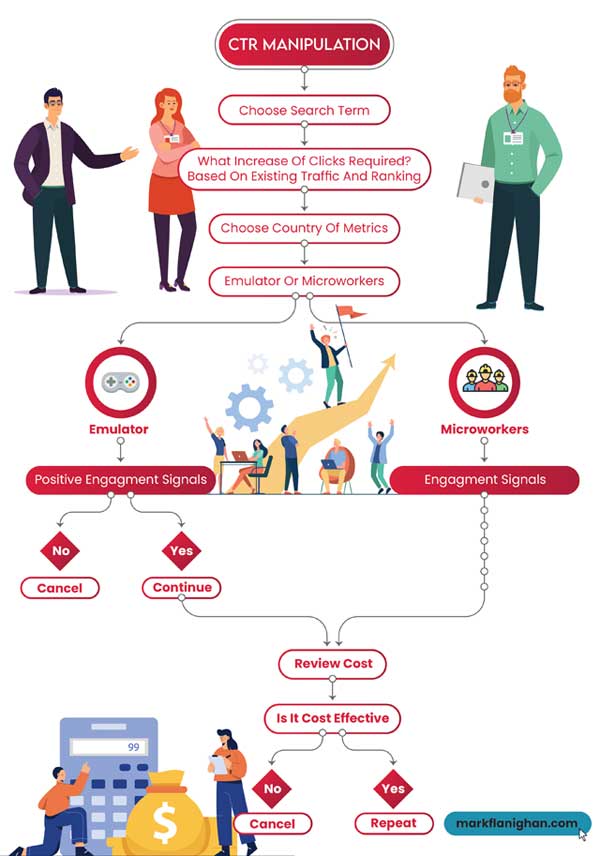Exploring the Relationship Between CTR Adjustment Services and Individual Behavior
In the realm of electronic advertising and marketing, the impact of click-through rate (CTR) adjustment solutions on individual habits stays a complicated and interesting topic. By studying the detailed relationship in between CTR control solutions and user habits, interesting understandings arise that might improve our understanding of digital advertising approaches and their effects on customers.
Impact of CTR Manipulation on Habits
Analyzing the impact of Click-Through Rate (CTR) control on customer habits reveals critical insights right into the characteristics of online interaction. CTR manipulation involves artificially inflating the number of clicks on a particular web link or advertisement to trick individuals and online search engine. This technique can lead to an altered understanding of a website's popularity or significance, inevitably influencing customer actions.

Furthermore, CTR manipulation can alter the information used by formulas to customize customer experiences. This can result in customers being offered web content that does not straighten with their preferences or interests, ultimately causing a decrease in user complete satisfaction and involvement. Understanding the effect of CTR control on customer actions is important for keeping transparency and count on online interactions.
Customer Interaction With Controlled CTR
Customer involvement with controlled CTR information commonly leads to manipulated understandings of on the internet web content popularity and importance. When users interact with material based on artificially inflated Click-Through Fees (CTR), they might believe that certain details, items, or solutions are more preferred or trustworthy than they really are. This can cause users making choices based on misleading information, causing possibly negative results.
Interaction metrics like likes, shares, remarks, and time invested in a web page are usually influenced by CTR manipulation. Users may be a lot more inclined to engage with content that appears to have greater interaction rates, even more bolstering the cycle of manipulated assumptions. As a result, material designers and marketers might prioritize creating material that generates high CTR rather than concentrating on creating really important and pertinent product.

Psychological Impacts of CTR Manipulation

Moreover, the emotional effects of CTR adjustment can also show up in altered decision-making processes. Individuals may be extra likely to click material only based on its regarded popularity, as opposed to its actual worth or importance to their needs. This behavior shift can cause a surface engagement with online material, where individuals may ignore premium yet much less popular offerings for those with synthetically improved CTRs.
In significance, the emotional ramifications of CTR manipulation highlight the value of preserving transparency and credibility in on the internet interactions to foster genuine individual engagement and count on.
Moral Considerations in CTR Control
CTR manipulation raises issues concerning deceiving customers, misshaping data analytics, and compromising the credibility of online material. By artificially pumping up CTR, customers may be misdirected right into clicking on web links or advertisements they would not have actually chosen or else, leading to an insincere online experience.
Another moral facet to consider is the fairness of manipulating CTR to obtain an unjust advantage over competitors. Participating in such practices not only breaches principles of fair play yet also threatens the trust fund that users place in on-line platforms. It is crucial for companies and digital online marketers to promote honest standards in their read what he said techniques to make certain More hints openness, integrity, and long-lasting sustainability in the online environment.
Effects for Digital Marketing
CTR adjustment can lead to skewed information analytics, misleading marketers into thinking that their campaigns are performing much better than they actually are. When users recognize that CTRs have been controlled, it can wear down trust in the brand, leading to long-lasting negative repercussions for client commitment and brand reputation.
Furthermore, using CTR control solutions can produce an unreasonable affordable landscape, where firms that engage in such methods get a man-made benefit over those that comply with moral marketing criteria. This can stifle technology and creativity in electronic advertising, as success ends up being even more concerning manipulation techniques than delivering real worth to customers. Inevitably, the ramifications of CTR manipulation for digital advertising and marketing prolong past temporary gains, influencing the overall sustainability and trustworthiness of marketing initiatives in the electronic realm.
Final Thought
To conclude, the relationship between CTR adjustment services and user actions is complex and diverse. The effect of CTR control on behavior, individual involvement with controlled CTR, emotional impacts, ethical factors to consider, and ramifications for electronic marketing all contribute in forming this partnership. Comprehending these characteristics is essential for marketing professionals and scientists alike in order to navigate the moral ramifications and make the most of the efficiency of their electronic advertising techniques.